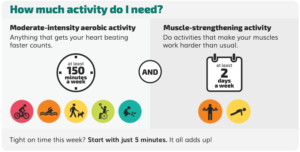The Australian Bureau of Statistics recently determined that “23.9% of people aged 15 years and over met the physical activity guidelines”, that’s almost 3 in 4 Australians not being active enough!!
Being active
Benefits
Being active helps you stay physically and mentally healthy – the more active you are, the more you benefit.
For adults, being active regularly can:
- reduce the risk of, or help manage, type 2 diabetes and cardiovascular disease
- maintain or improve blood pressure, cholesterol and blood sugar levels
- reduce the risk of some cancers
- prevent unhealthy weight gain and help with weight loss
- maintain strong muscles and bones
- create opportunities for socialising and meeting new people
- help develop and maintain physical and mental wellbeing.
Recommendations
Adults should be active most days, preferably every day. Each week, adults should do either:
- 2.5 to 5 hours of moderate intensity physical activity – such as a brisk walk, golf, mowing the lawn or swimming
- 1.25 to 2.5 hours of vigorous intensity physical activity – such as jogging, aerobics, fast cycling, soccer or netball
- an equivalent combination of moderate and vigorous activities.
Include muscle-strengthening activities as part of your daily physical activity on at least 2 days each week. This can be:
- push-ups
- pull-ups
- squats or lunges
- lifting weights
- household tasks that involve lifting, carrying or digging.
Doing any physical activity is better than doing none. If you do no physical activity right now, start by doing some, then slowly build up to the recommended amount.
Building activity into your day
Physical activity doesn’t have to be structured. Making some small changes to your daily routine can make a big difference. For example, you could:
- walk or ride your bike for short trips instead of driving
- drive to a ‘park and ride’ spot, and walk or ride your bike the rest of the way
- use the stairs instead of the lift or escalator
- get off the bus one stop earlier and walk the rest of the way
- park further away from your destination and walk
- walk to the park to eat lunch.
Limiting time sitting and lying down
Long periods of sitting can offset the benefits of being physically active, so it’s important to:
- reduce the time you spend sitting – for example, by organising walking meetings, using a standing desk, or enjoying a walk during your lunch break
- break up long periods of sitting – for example, by doing lunges or star jumps or walking around when on the phone.
If exercise could be put in a pill it would be prescribed to everyone. So, get active even in the smallest ways, your brain and body will thank you!!!



